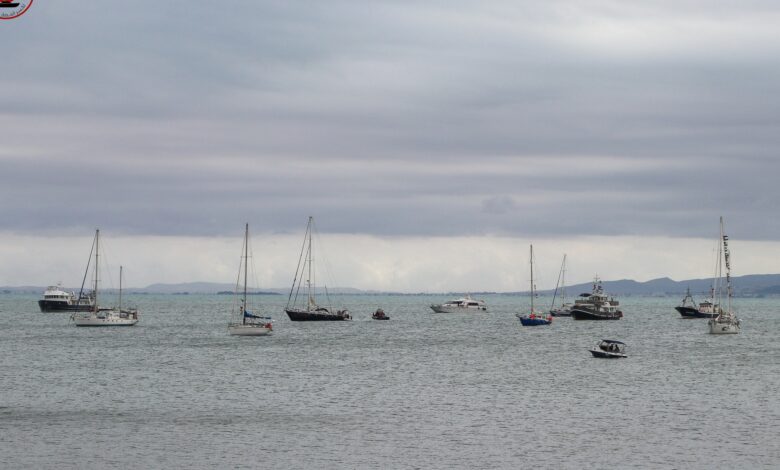“Silent Regimes Have Failed Us”: Maghreb Flotilla Calls Out Arab Governments, Vows Solidarity with Gaza

A wave of small boats from across the Maghreb has joined the global Sumud flotilla aiming to break Israel’s blockade of Gaza. Organizers say more than 50 vessels and delegations from over 40 countries are taking part.
We spoke with Ayoub Habraoui, Morocco’s representative in the Maghreb section of the flotilla and a member of the Tunis-based steering committee, about the mission, the risks and what the Maghreb contingent hopes to prove.
Unity and scale
“A Maghreb section is different because it grew from a land convoy,” Habraoui told QNN. “It is an extension of the convoy that tried to break the siege by land. What marks us is Maghreb unity and the people’s will to break the blockade on Gaza.”
Habraoui said the Maghreb effort brought together hundreds of participants and “dozens of boats” from Morocco, Algeria, Tunisia, Mauritania and Libya. He said the turnout reflected deep public sympathy for Gaza across North Africa.
The Global Sumud Flotilla is the largest coordinated maritime mission to Gaza since the 2010 Gaza flotilla. The international campaign bundles smaller civil-society groups into a single effort to deliver aid and to force open sea access to Gaza.
A Tunisian delay, no detours
The flotilla, which recently resumed its voyage to Gaza, had been delayed due to technical and logistical reasons. Habraoui told QNN the launch was moved to Wednesday, 10 September, to ensure safety at sea, especially for smaller vessels. He stressed that from Tunisia the boats would head straight for international waters off Gaza rather than stop at intermediate ports. “We will sail to international waters and then to Gaza’s coast. There will be no stops. We do not want to enter a port that could prevent our mission,” he said.
That plan reflects organisers’ stated aim to avoid being blocked by third countries and to present a direct maritime challenge to the blockade.
Aid, strategy and limits
Habraoui was frank about what the flotilla can realistically carry. “Our primary goal is to break the siege and show the people and governments that we can reach Gaza. We have aid on board, but it will not meet Gaza’s needs. The real responsibility for large-scale aid rests with Arab states; especially Egypt, which must open Rafah,” he said.
Organisers have said the shipments include food, baby formula and medical supplies, but that the real aim of the mission is political: to force a change in access and to raise international pressure.
The flotilla has faced intimidation and direct attacks. In Tunisia, a boats preparing to sail was damaged in an Israeli drone strike. The incident has raised fears of interception at sea.
Habraoui said the Maghreb crew expects all scenarios. “We are a peaceful humanitarian movement. We expect anything from the occupying entity. We are ready for every scenario. We may be taken captive. We may be martyred. But we will not use violence even if it is used against us,” he said.
He appealed to the home governments of participants, from at least 47 countries, to pressure any power that might harm civilians on mission. He also put faith in street pressure. “Our hope is the peoples of the world. If they fill streets and ports with solidarity, that is our shield,” he said.
The Maghreb delegation mixes professionals and public figures. Habraoui listed doctors, lawyers, journalists, artists and activists among the passengers. He highlighted Moroccan activist Khadija Riyadi, the only Arab recipient of a UN human rights award, and said some parliamentarians and public figures were aboard alongside ordinary citizens.
If ships are seized or crews detained, Habraoui said organisers will pursue legal avenues. “We will resort to the International Court and legal channels. Seizing our ships or detaining us is illegal under international law,” he said. He stressed the flotilla would leave Tunisian territorial waters for international waters before approaching Gaza’s territorial sea, which belongs to Gaza.
A message to Gaza
To people in Gaza, Habraoui was honest. “We cannot promise to end the war or bring enough aid. Our message is: we want to be with you. We want to live your conditions. If we reach you, we will stand with you as human shields,” he said. He also issued a rebuke to Arab governments: “These regimes that stayed silent have betrayed you. We feel that betrayal too. We will still try to reach you.”
The Global Sumud Flotilla comes amid an Israeli-made famine in Gaza that has drawn global protests and calls for corridors of aid. The flotilla is both a relief effort and an act of civil disobedience. For Maghreb activists, it is also a test of regional solidarity and a public rebuke of governments they say failed to protect the Palestinian people.
If the Maghreb boats reach Gaza, the mission could break a barrier that has lasted for decades. If they are intercepted, the legal and political fallout will be swift and international. Either way, Ayoub Habraoui said the Maghreb will not back down. “If they strike dozens of boats, hundreds will come. If they strike hundreds, thousands will sail. The people are ready to sacrifice to break the siege,” he said.




